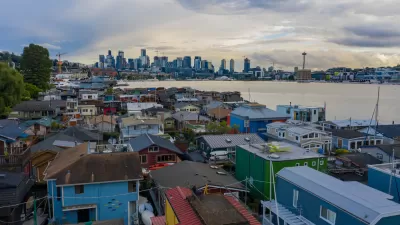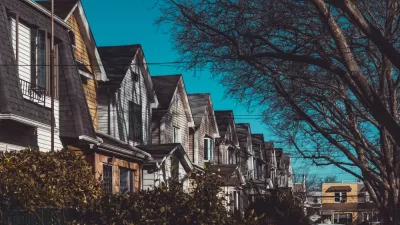The historically comprehensive study outlines the policies that have shaped homeownership, generational wealth, and economic development in the Puget Sound region.

A new report from the Puget Sound Regional Council (PSRC) connects single-family zoning to structural racism in the region, reports Shaun Kuo in The Urbanist.
Unlike previous studies of the issue, Kuo notes, the Legacy of Structural Racism Interactive Report “provides a high-level overview and collection of resources on this history of structural racism in the Puget Sound region. It is also authored by a government agency that is key to the long-range land use, transportation, and economic planning of the Puget Sound region and is empowered with the distribution of federal funding.”
The report outlines the region’s history dating back to the 1700s, highlighting the removal of Native Americans, the expulsion of Chinese people, and other racially motivated events in the area’s history up to and including 20th century redlining and its lingering modern-day effects.
“This report does much to pair the historic suppression of nonwhite wealth building with the retention of land use policies that increase the cost of homeownership. It demonstrates the legacy of these practices in the massive wealth gap between White and Black households, wherein for every dollar a White family has, a Black family has a little more than 10 cents.”
The report also notes the impact of highway construction on primarily poor and non-white neighborhoods. “PSRC’s report discusses how whiter and wealthier neighborhoods like Mercer Island were able to get highway lids and public parks to mitigate highway construction. Meanwhile, neighborhoods like the Chinatown-International District were denied mitigation.”
See Kuo’s article for more details and a link to the full report.
FULL STORY: PSRC Report Connects Single Family Zoning and Highways with Structural Racism

Planetizen Federal Action Tracker
A weekly monitor of how Trump’s orders and actions are impacting planners and planning in America.

Maui's Vacation Rental Debate Turns Ugly
Verbal attacks, misinformation campaigns and fistfights plague a high-stakes debate to convert thousands of vacation rentals into long-term housing.

Restaurant Patios Were a Pandemic Win — Why Were They so Hard to Keep?
Social distancing requirements and changes in travel patterns prompted cities to pilot new uses for street and sidewalk space. Then it got complicated.

In California Battle of Housing vs. Environment, Housing Just Won
A new state law significantly limits the power of CEQA, an environmental review law that served as a powerful tool for blocking new development.

Boulder Eliminates Parking Minimums Citywide
Officials estimate the cost of building a single underground parking space at up to $100,000.

Orange County, Florida Adopts Largest US “Sprawl Repair” Code
The ‘Orange Code’ seeks to rectify decades of sprawl-inducing, car-oriented development.
Urban Design for Planners 1: Software Tools
This six-course series explores essential urban design concepts using open source software and equips planners with the tools they need to participate fully in the urban design process.
Planning for Universal Design
Learn the tools for implementing Universal Design in planning regulations.
Heyer Gruel & Associates PA
JM Goldson LLC
Custer County Colorado
City of Camden Redevelopment Agency
City of Astoria
Transportation Research & Education Center (TREC) at Portland State University
Jefferson Parish Government
Camden Redevelopment Agency
City of Claremont





























